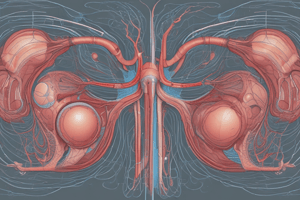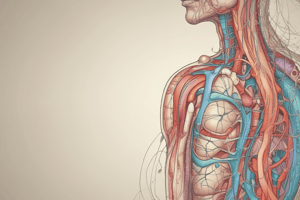Podcast
Questions and Answers
What are the main functions of the urinary system?
What are the main functions of the urinary system?
The main function of the urinary system is to remove liquid waste from the blood through urine, maintain a balance of salts in the blood, and produce erythropoietin.
Describe the location of the kidneys in the body and speculate as to why they are where they are.
Describe the location of the kidneys in the body and speculate as to why they are where they are.
The kidneys are located on either side of the body underneath the diaphragm near the lower back. They are positioned there for protection by the rib cage due to their importance.
Describe the general structure and function of the ureters, bladder, and urethra.
Describe the general structure and function of the ureters, bladder, and urethra.
Ureters: tubes that carry urine from the kidneys to the urinary bladder, each about 10-12 inches long. Bladder: a muscular sac in the pelvis that stores urine. Urethra: the tube carrying urine from the bladder to outside the body.
Describe the anatomy and physiology of kidney filtration.
Describe the anatomy and physiology of kidney filtration.
List 3 of the 4 major roles carried out by the kidneys and describe their importance to the body.
List 3 of the 4 major roles carried out by the kidneys and describe their importance to the body.
Match the following terms with their definitions:
Match the following terms with their definitions:
Flashcards are hidden until you start studying
Study Notes
Functions of the Urinary System
- Primary role is to eliminate liquid waste from the blood via urine production.
- Maintains electrolyte balance within the blood.
- Produces erythropoietin, a hormone crucial for red blood cell production.
Location of the Kidneys
- Positioned on both sides of the body beneath the diaphragm, near the lower back.
- Their location is strategic to protect them from damage, safeguarded by the rib cage.
Structure and Function of Urinary Organs
- Ureters: Tubes (10-12 inches) transporting urine from kidneys to the bladder.
- Bladder: A muscular sac in the pelvis allowing for urine storage and controlled urination.
- Urethra: Tube conveying urine and other secretions from the bladder to the exterior; lined with mucous membranes and muscular tissue.
Kidney Filtration Anatomy and Physiology
- Composed of approximately a million nephron filtering units.
- Glomerulus: A capillary cluster within a nephron that filters blood, permitting fluid and waste while blocking cells and large proteins.
- Processed fluid travels through a tubule back into the bloodstream, while waste moves via ureters to the bladder.
Major Roles of the Kidneys
- Blood Filtration: Prevents waste accumulation in the bloodstream, crucial for overall health.
- Waste Collection: Collects waste products through tubular systems.
- Hormone Production: Regulates red blood cell production, supports bone health, and manages blood pressure.
- Electrolyte Balance: Keeps electrolyte levels stable, ensuring normal physiological functions.
Key Terms
- Electrolyte: Substance forming an electrically conductive solution when dissolved in water.
- Glomerulus: A nexus of capillaries for filtering waste from blood in the kidneys.
- Kidneys: The pair of abdominal organs excreting urine.
- Micturition: The process of discharging urine from the bladder.
- Nephron: The kidney's functional unit responsible for blood filtration.
- Renal Artery: Blood vessels stemming from the abdominal aorta supplying the kidneys.
- Renal Capsule: Tough fibrous layer encasing the kidney, covered by adipose tissue.
- Urethra: Duct for urine expulsion from the bladder.
- Urethral Sphincter: Muscle controlling urine exit from the urinary bladder through the urethra.
- Urine: Liquid excretion product from the kidneys, expelled via urination.
Studying That Suits You
Use AI to generate personalized quizzes and flashcards to suit your learning preferences.



